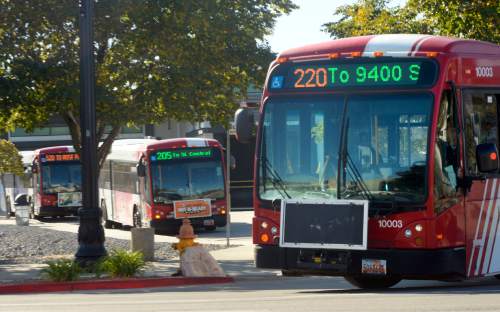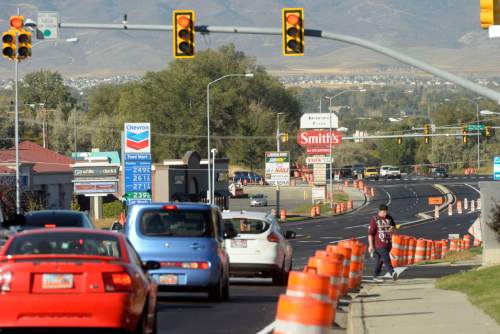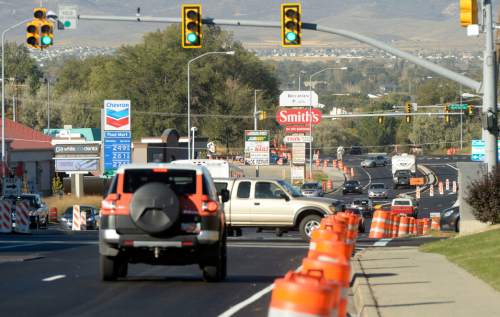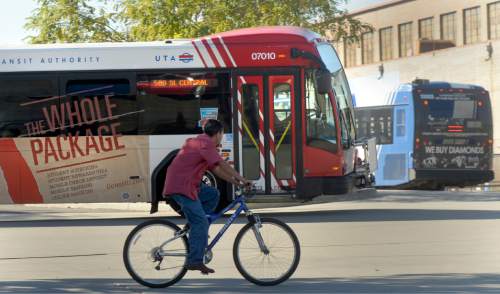This is an archived article that was published on sltrib.com in 2015, and information in the article may be outdated. It is provided only for personal research purposes and may not be reprinted.
Supporters and critics of Proposition 1 disagree about its true aim: whether it is mostly to fix long-neglected local roads or to provide bigger subsidies to the sometimes-controversial Utah Transit Authority.
It would do both on the Wasatch Front, and different sides argue whether that is worth the cost of the higher taxes it would impose.
Many voters already have received mail-in ballots to decide the issue in the Nov. 3 election.
So here is a look at what the proposition would do, its costs and some of the arguments for and against it.
—
What is Prop 1? • It would raise sales taxes by a penny for every $4 in purchases. Legislative analysts figure it would cost about $50 per person a year. The Legislature this year allowed each county to decide whether to put the measure on the ballot.
Seventeen of Utah's 29 counties did so this year, including all large Wasatch Front counties. Voters decide whether it will pass within their county's borders. So, for example, it is possible for Salt Lake County to pass it, but for Utah County to defeat it.
That could lead to some further tax disparity, which some legislators have publicly worried could lead people to shop in lower-tax counties for major purchases such as cars. Counties that pass Prop 1 would boost the sales tax on a $30,000 car by $75.
—
Where would money go? • On the Wasatch Front, 40 percent of the money, by law, would go to the UTA. Another 40 percent would go to cities and unincorporated-area service districts for local roads, trails, bike paths, sidewalks and similar projects. Twenty percent would go to counties for transportation projects of regional significance.
In counties without a transit agency such as the UTA, 40 percent would go to cities and 60 percent to counties. Of note, Cache, Summit and Washington counties — which have their own transit agencies — all chose not to put Prop 1 on the ballot this year, while all counties served by UTA will vote on it.
—
Local road plans • Mayors, county leaders and business groups that favor Prop 1 stress that it would help improve local roads.
For example, Sandy Mayor Tom Dolan says the city-county share of state gasoline taxes once paid for all local road needs. But that tax had not been raised in 18 years (although a new 5-cents-a-gallon increase will take effect Jan. 1).
The buying power of the gasoline tax decreased by 40 percent because of inflation since that tax was last raised, says Andrew Gruber, executive director of the Wasatch Front Regional Council.
Many cities during the period have either deferred needed road maintenance or raided general funds to fix roads — hurting other services such as police, fire and recreation, says Dolan. With the Wasatch Front population expected to double in the next 30 years, added the Sandy mayor, cities need the tax hike to start catching up on road needs.
"Even with all this [Prop 1 and the gasoline tax], funding still will not be adequate to meet our long-term needs," says Cottonwood Heights Mayor Kelvyn Cullimore Jr. "But it's going to be a big help."
"As a Republican, I really loathe tax increases," Cullimore says. But Prop 1 "will actually save money in the long run because if we can properly maintain and service our roads now, not only does it service the economy better but it avoids the long-term impacts of deteriorating roads, which become much more expensive" to fix — he says six times as much.
Some cities have provided plans for local projects they hope to fund, which can be seen through the Prop 1 Utah smartphone app from proponents and on their campaign website. But many say specifics would come later as cities prioritize needs.
For example, Cullimore says, one resident told him he would vote for Prop 1 if he could promise a sidewalk on 1700 East. "I said, 'OK, I can't promise you that. But I can promise you that without this money, there definitely will not be a sidewalk.' "
—
Transit controversy • While little opposition has arisen to spending more on local roads, critics focus their attacks on plans to give 40 percent of the proposed money to UTA.
"By voting 'no,' we can send this proposition back to the Legislature and ask them to allow Utah County to address our actual local needs without further subsidizing UTA," says a statement by Utah County Commissioner Bill Lee, Mapleton Mayor Brian Wall, state Sens. Margaret Dayton and Mark Madsen and Rep. Brian Greene.
Evelyn Everton, Utah director of Americans for Prosperity, says UTA "certainly has not been a good steward of our tax dollars. It's been well documented that fraud, waste and abuse has occurred at that agency."
A legislative audit last year scolded UTA for sweetheart deals with developers, high salaries, bonuses and extensive executive travel.
"So we want to make sure that if we are asking for money for roads," Everton says, "that the money will actually go to roads and not to fill the coffers of the UTA."
Controversy over UTA management was one reason the state Senate in 2014 killed a separate tax increase then proposed for the agency.
Since then, UTA has taken several steps to help polish its image.
Former UTA President and CEO Michael Allegra (whose total 2013 compensation was $402,187, including benefits and a $30,000 bonus) and general counsel Bruce Jones (whose 2013 compensation was $384,472, with a $30,000 bonus) have since retired, although Allegra will be on the payroll for six months as a senior adviser.
The UTA board adopted policies that reduced the maximum-allowed executive bonus from $30,000 in 2013 to $7,500 in the future. Last week, top agency executives told the UTA board that they will forgo bonuses next year and asked that the money be used to expand transit services.
The board also adopted a policy requiring any international executive travel to be approved in a public meeting of the full board.
However, The Salt Lake Tribune earlier this year found UTA did not follow that policy when executive committee members approved travel to Japan for Allegra. That trip was canceled about the time the newspaper made inquiries about it after UTA initially indicated no such trip was to occur.
UTA also appointed a new board chairman last year, H. David Burton, former presiding bishop of The Church of Jesus Christ of Latter-day Saints, who has a reputation for honesty and integrity.
—
UTA plans • The transit agency figures that Prop 1 could boost its revenues by 13 percent, or $39 million a year — if it passes in all six counties where it operates. The UTA Board has committed to use any Prop 1 funds primarily to expand bus service, including more frequency, longer service hours and more weekend service.
Bus service had been cut in recent years because of the recession and to help pay for rapid expansion of TRAX and FrontRunner rail lines. Burton has said that UTA has heard "loud and clear" that the top priority for taxpayers is to boost bus service.
The agency has posted online some specifics of where it is considering more bus service.
That information is also on the Prop 1 Utah smartphone app.
UTA estimates that its plans will increase transit ridership by 15 percent, remove 2.3 million car trips from the road each year, and improve service to 60 percent of minorities, low-income and no-car households.
In August, UTA expanded some weekend service tapping savings from low fuel costs and higher-than-expected sales-tax revenue. The extended schedule has proven popular, and UTA officials have said it is an example of what Prop 1 could do.
Draper Mayor Troy Walker, one of several mayors and county commissioners who serve on the 16-member UTA Board, say they will ensure that the agency keeps its promises for Prop 1.
"If UTA tries not to keep its commitment, they'll need a restraining order against me," he says. Walker adds that expanding transit is needed for overall transportation plans to handle Utah's growing population.
—
Affordable? • Everton, with Americans for Prosperity, argues that the tax hike will hurt families — especially because it comes in the same year that the Legislature raised property taxes for schools by $75 million and the gasoline tax by 5 cents a gallon.
"Utahns have been taxed enough already," she says. "We really pride ourselves as being a low-tax, great-economy state. But all these taxes put that at risk."
Everton adds Prop 1 "disproportionately affects low-income families who are already struggling to adjust their budgets to the new tax increases. This would mean that many families cannot afford to buy a lot of the things they need."
—
Campaign donors • Critics of Prop 1 have not funded an organized campaign against it. But supporters formed a political issues committee, Utahns for Responsible Transportation Investments, which has raised $519,000 for a campaign on TV, radio, billboards, mail, social media and "robocalls."
Much of its money comes from companies that build roads or manufacture mass-transit buses and would directly benefit from Prop 1.
For example, California-based Gillig — which makes some buses used by UTA — donated a hefty $25,000. Giving twice as much — $50,000 each — were two road-construction firms, Utah-based Staker Parson Cos. and the Clyde Cos. Parsons Brinckerhoff, a global engineering firm involved in road construction, provided $55,000.
Abby Albrecht, campaign director for URTI, says such companies "were easy low-hanging fruit" for campaign organizers to ask for donations and notes much is also coming from other businesses that depend on roads to move goods.
But Everton said the donors are a who's who of transportation firms that would directly benefit financially from passage of Prop 1.
"I would encourage voters to pay attention when they are seeing the glossy mailers and the feel-good commercials to understand who is funding this big campaign," Everton says, noting that it is "road construction companies and those that would benefit from a $100 million new pot of money that taxpayers would be contributing."
Everton's Americans for Prosperity, the most outspoken opponent of Prop 1, in turn has been criticized by Albrecht and Prop 1 supporters as "an out-of-state special-interest group."
AFP was started by conservative oil baron and philanthropist brothers David H. Koch and Charles Koch, and is seen as their primary political advocacy group. As a tax-exempt nonprofit entity, AFP is not legally required to disclose its donors — and it has poured big money into politics nationally, akin to what political parties spend.
Everton said AFP's Utah chapter is one of 36 nationally, adding that it is a local group. She said its tax-exempt nonprofit status allows only educational efforts, including about how tax dollars would be spent, so it is not helping to fund any political advertising campaign against Prop 1. —
Prop 1 on the ballot
The 17 counties putting Proposition 1 on their ballots are:
• Beaver
• Box Elder
• Carbon
• Davis
• Duchesne
• Grand
• Juab
• Morgan
• Rich
• Salt Lake
• San Juan
• Sanpete
• Sevier
• Tooele
• Utah
• Uintah
• Weber
Source: Utahns for Responsible Transportation Investments.









